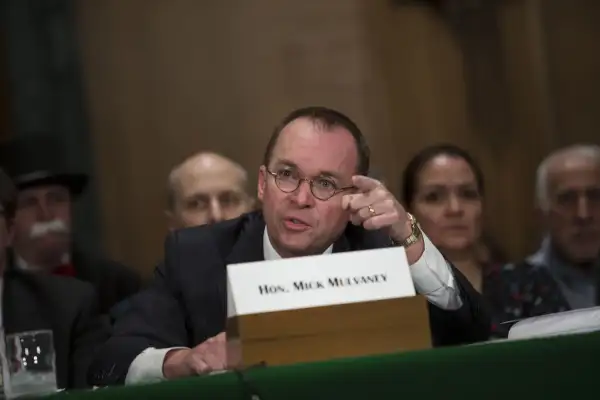Trump's Top Consumer Cop Tells Congress, 'Please Take My Power Away'

It’s a rare when a Washington bureaucrat asks Congress for less authority and independence.
Yet that’s exactly what the Consumer Financial Protection Bureau acting director Mick Mulvaney used his appearance at a Senate hearing on Thursday to do. He presented CFPB's semi-annual report and took the opportunity to ask lawmakers for a wide range of reforms at the agency, which he took over in November after being appointed by President Donald Trump.
Mulvaney, who also runs the Office of Budget Management, has already made some big changes of his own, not least of all easing up on the bureau's aggressive enforcement approach.
But Mulvaney wants a complete overhaul—so he took his requests to Congress. “There are a bunch of things we can do to make this better without undermining the mission,” Mulvaney told senators. “I very much hope that both the House and Senate choose in the near future to take back some of their oversight ability over this Bureau.”
Given Mulvaney describes his own attitude as “hostile to the existence of the Bureau,” his position is hardly surprising. Here’s what he’s asking Congress to do next.
Change Funding Flow
The CFPB's budget is paid by the Federal Reserve, meaning unlike many federal agencies it doesn't have to ask Congress for money each year. Mulvaney asked Senators on Thursday to change that. He thinks requiring the CFPB to annually present lawmakers with a detailed list of proposed spending items would make it more transparent.
“There’s a lot of stuff that goes on that you all don’t know about unless you know to ask,” Mulvaney told senators.
He noted that currently there are 370 people employed by the CFPB that make more than the $174,000 members of Congress do—a statistic of which many may not have been aware because the budget is conducted at the discretion of the CFPB director.
“There’s no reason for this Bureau to be a black hole,” Mulvaney said.
Get Buy-In From Congress
Under direction of Richard Cordray, Mulvaney's predecessor, the CFPB independently wrote many new financial industry rules. This independence proved controversial, however. And Congress ultimately struck down several of its rules—including the so-called arbitration rule that allowed class actions against companies like banks and credit card issuers.
To head off future fights, Mulvaney wants Congress to approve all major CFPB rules in the future.
Reduce CFPB Director’s Independence
Mulvaney and other CFPB critics have long complained the agency's head is too independent, especially since once appointed he or she cannot be fired except for cause. That criticism gained steam after a federal court in October 2016 ruled the arrangement was unconstitutional.
That ruling was reversed earlier this year—but Republican lawmakers are seeking to limit the CFPB director’s authority. In fact, Mulvaney, also supports the idea. On Thursday, he asked senators for a law that would give the President greater control of the CFPB director.
Mulvaney also supported replacing a single CFPB director with a five-person commission, similar to the one that oversees the SEC.
“I don't know if any director of any bureaucracy has ever come to you and said, 'please take my power away', but that's what I'm doing,” he told Senator Tom Cotton, R-Ark.
Tighten Internal Oversight
In addition to giving Congress and the White House more say, Mulvaney also wants the CFPB to have its own internal watchdog.
Right now, the Federal Reserve and the CFPB share the same inspector general, an office that monitors each agency’s work. However, Mulvaney said Thursday that the CFPB should have its own dedicated independent inspector general who would be more familiar with its work.
“I honestly don’t know what the objection is,” Mulvaney told senators. “I don’t know how often federal agencies come to you and say please, please give me more IG oversight—give me my own.”
And Mulvaney may get his wish. Last month, the Senate passed legislation that would roll back the 2010 Dodd-Frank law.
While the Senate bill largely left the CFPB intact, the House bill, still under consideration, may not. Indeed, Jeb Hensarling (R-Texas), chair of the powerful House Financial Services Committee, has already attempted to add several proposals that would limit the authority and scope of the CFPB.